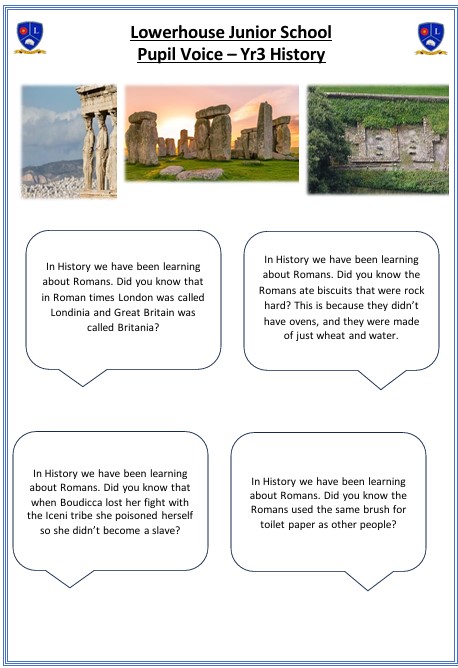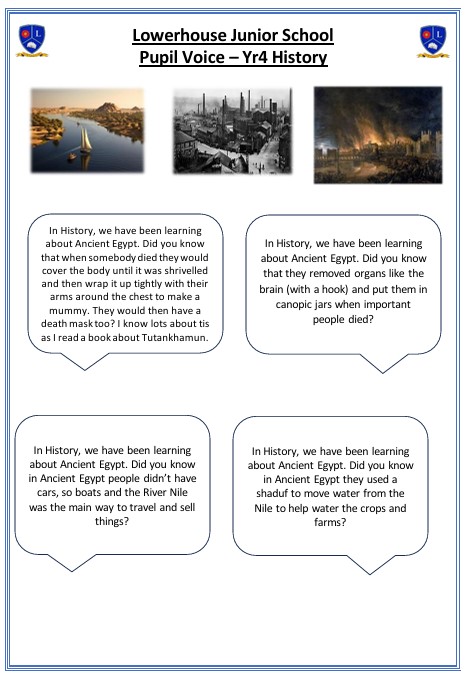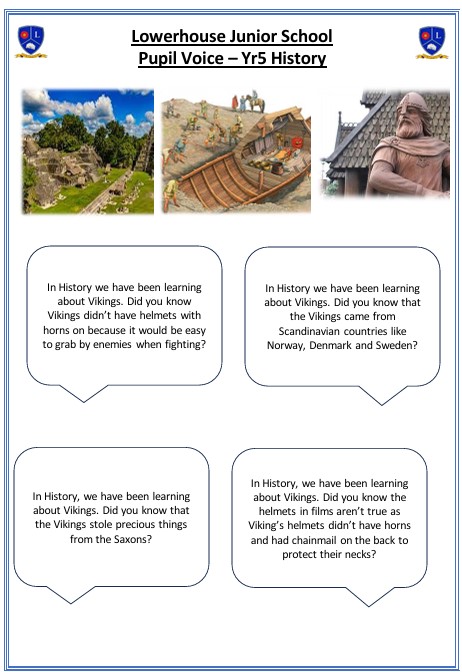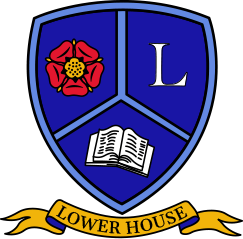History
History Co-ordinator: Miss E Lee
The teaching of history gives pupils an understanding of the past through learning about human achievements and experiences. We investigate a range of sources to ask and answer questions about the past and how these impact the world we live in today. We examine the children’s own personal history, and develop their sense of chronology through the study of topics throughout the key stage. Over the course of the past two years, the staff of Lowerhouse Juniors have worked to adapt the history curriculum to the needs of our children. We feel that the curriculum is now an enriched and cohesive sequence of topics which our children will truly enjoy! Please check our Curriculum Overviews below.
Intent
At Lowerhouse Junior School we want all of our pupils to have an understanding of the past and how history has and will continue to shape their future. We want to develop children’s awareness of the past and allow them to begin to appreciate history in a chronological context. They will work on securing an understanding of British, local and world history. Children will look at connections and patterns over time and develop a good use of historical terms. There will also be a focus on different sources and how our knowledge of the past is shaped from them. Through high-quality history lessons we aim to encourage critical thinking, as well as helping the children to gain a sense of their own identity within a social, political, cultural and economic background. History at Lowerhouse engages children, sparks curiosity and helps to foster creativity through hands on activities, exploration, collaboration and discussion. Throughout school we aim to ensure that children secure a coherent knowledge and understanding of Britain’s past and that of the wider world.
Implementation
At Lowerhouse Junior School, we have developed our history curriculum using a triangulation approach to curriculum development and design.
This is done by: identifying key vocabulary that the children must know to access their topics; developing inquisitive and insightful questions that engage the learner’s natural questioning around topics and key facts and knowledge that the children will acquire as they go through their geographical journey within their topics.
We have identified key skills for each individual historical topic across all year groups. This has enabled teachers to really focus on how the children are going to obtain these skills within their topics.
Starting sessions with key questions enables the children to be engaged in their understanding of what they are being taught but also enables easier assessment of how the concepts have been taught, and the understanding obtained in each session.
Identifying key vocabulary prior to teaching each topic allows for an easier transition of understanding acquired by the children. It also breaks down misconceptions about words and enables cross-curricular opportunities for upskilling vocabulary across writing topics.
We have developed a scheme of work for each topic that enables staff to understand what they need to cover for knowledge, vocabulary and skills taught in their year groups.
Impact
The impact of what we have done has been positive for children, teachers and subject leadership.
Teachers understand clearly what they have to teach but also why they have to teach it. This allows for teachers who find history a difficult subject; to feel empowered and confident about their delivery. It also gives signposts for all in terms of resources available in school and out of school. This saves teacher time in terms of planning and preparation and impacts massively on their work life balance. Ultimately, allowing teachers to be more confident of their delivery of history.
Teachers know explicitly what needs to be taught in their topics and this also allows for teachers to be creative in how they would like to teach their topic but also allows for teachers new to the subject to feel safe about what they are delivering meets the standards required and helps them develop their own knowledge and understanding of their skills and vocabulary.
For the children, the first major impact we have seen is that they enjoy their history lessons. Through pupil conferencing, pupils can explain their key vocabulary being taught and can explain geographical concepts taught by using the knowledge and skills obtained through a historical topic.
History Overviews and Knowledge Organisers
Follow the links below to find out more about our History curriculum across our year groups.
Year 3 History Overviews and Knowledge Organisers
Click on the links below to view Year 3 Overviews and Learning
Year 3 – Ancient Athens and Sparta
Year 4 History Overviews and Knowledge Organisers
Click on the links below to view Year 4 Overviews and Learning
Year 5 History Overviews and Knowledge Organisers
Click on the links below to view Year 5 Overviews and Learning
Year 5 – Sutton Hoo Anglo Saxons and Yr5 History - Saxons Knowledge Organiser
Year 5 – Viking Brutal Invaders and Yr5 History - Vikings Knowledge Organiser
Year 5 – Ancient Mayan Drought and Yr5 History - Mayans Knowledge Organiser
Year 6 History Overviews and Knowledge Organisers
Click on the links below to view Year 6 Overviews and Learning
Year 6 – Evacuation of Children in World War II and Yr6 History - WWII Knowledge Organiser
Year 6 – Lancashire Crime and Punishment and Yr6 History - Crime and Punishment Knowledge Organiser
Pupil Voice
Pupil voice is incredibly important in our school. Please read some of the comments from our pupils over the year about their learning.
Pupil Voice - History



